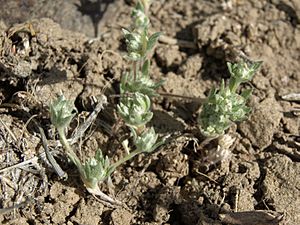Baretwig neststraw facts for kids
Quick facts for kids Baretwig neststraw |
|
|---|---|
 |
|
| Peck neststraw, Stylocline psilocarphoides, White Mountains, elevation 1705 m (5590 ft) | |
| Scientific classification | |
| Kingdom: | |
| (unranked): | |
| (unranked): | |
| (unranked): | |
| Order: | |
| Family: | |
| Tribe: |
Inuleae
|
| Genus: |
Stylocline
|
| Species: |
S. psilocarphoides
|
| Binomial name | |
| Stylocline psilocarphoides M.Peck
|
|
Stylocline psilocarphoides is a small flowering plant. It is part of the aster family, which includes many well-known flowers like sunflowers and daisies. People often call this plant baretwig neststraw or Peck's neststraw.
This tiny plant is an annual herb. This means it completes its whole life cycle, from seed to flower to new seeds, in just one year. It grows close to the ground, making it easy to miss!
About This Plant
Stylocline psilocarphoides is a very interesting plant. It is known for its unique look and where it chooses to grow. It's a great example of how plants adapt to tough environments.
Where It Grows
This plant is native to the western United States. You can find it in states like Idaho, Nevada, Oregon, Utah, and California. It loves dry places!
It often grows in deserts and other areas with sandy or gravelly soil. These are tough spots for many plants, but Stylocline psilocarphoides thrives there. It's a true desert survivor.
What It Looks Like
Stylocline psilocarphoides is quite small. Its stems usually grow from 1 to 18 centimeters long. That's about the length of your finger to a small ruler!
The plant has a special texture. It feels woolly or felt-like because it's covered in soft, white hairs. These hairs might help protect it from the sun in its dry habitat.
Leaves and Flowers
The leaves of this plant are pointed. They can be up to 1.8 centimeters long. They are arranged alternately along the stem. This means they grow one after another, not directly opposite each other.
The plant produces small, oval-shaped flower heads. These heads are tiny, usually less than half a centimeter across. They look like a hardened ball of many woolly white flowers all packed together. Sometimes, these flower heads don't have the usual protective leaves called phyllaries, or they fall off very early.

